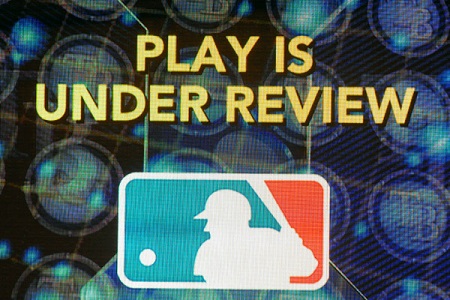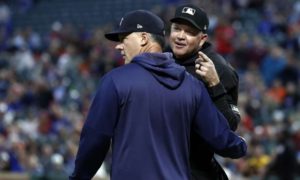We’re two weeks in and it’s indisputable: replay in baseball is flawed. It’s confusing everyone involved–fans, umpires, players, broadcasters, managers, and talk show hosts alike; it’s making a too-long product even longer; and it’s altering fundamental elements of the game, both philosophically (e.g. manager argument) and technically (the double play transfer). Baseball is notorious for is resistance to change, but replay in it’s current form represents an over-correction. Does the game need to incorporate advanced technology? Unequivocally. Is what we have now cutting it? Absolutely not. Fortunately for Joe Torre and Tony LaRussa, I’ve got some ideas.
The most flagrant flaw of the current system is the existence of the clandestine “video coordinator.” Anyone watching the first week of the season will have noticed a distinct lack of hustle on the part of the managers. The seething, bull-see-red charge from the dugout that made Lou Pinella a cult hero is dead; in its place we have a new phenomenon. On a potentially reviewable play, managers now stroll from the dugout, crossing the field with calculated sloth before positioning themselves with a view to the bullpen video phone. They chit-chat with the ump until the decision whether or not to challenge is made in an office deep within the stadium, and relayed to the field by telephone via the bench coach. For any number of reasons, this is absurd.
For one thing, it takes ages. With mounting frustration surrounding game duration and yawn-factor (I talked a bit about this here), the last thing baseball needs is more periods of down time devoid of tension. But of greater concern than audience boredom is what this system has taken from the game. There is no skill required to walk onto the field and wait for de facto confirmation of what you are about to challenge before you challenge it. It relegates managers to messengers, and takes from them–and the viewer–an element of passion that, quite frankly, is important. (Blue Jays’ manager John Gibbons has voiced some of these same concerns.)
So how do we keep replay and maintain the integrity of the manager’s role? Easy: nix the video coordinator. If managers want to challenge, they should have to do so on the same grounds that Pinella would have shot from the dugout–a visceral conviction that a call was just blown. No video coordinator means managers could add value by actually getting “good” at challenging. In fact, it adds another compelling layer to the phenomenon of the manger blowup. In the old days, when Lou threw a tantrum, he knew two things before going out there: it didn’t matter what he did because the call would stand, and if he was wrong he wouldn’t have to face it till the postgame interview. With replay, both umpire and manager are immediately accountable.
Another problem this tweak would remedy (at least in large part) is the increasing prevalence of the frivolous, tic-tac challenge. As is common with avant-garde systems, the spirit of baseball’s instant replay–to overturn bad calls–is being co-opted by the high stakes of the game. The desire to win clouds the spirit of the system. Case in point, this Red Sox’ challenge from Saturday, April 12th:
<iframe src=’http://m.mlb.com/shared/video/embed/embed.html?content_id=32022729&topic_id=63817564&width=400&height=224&property=mlb’ width=’400′ height=’224′ frameborder=’0′>Your browser does not support iframes.</iframe>
This, ladies and gentleman, is not why we are here.
Without a video coordinator buried amidst a panopticon of monitors and screens, the above travesty, mockery, abomination, insult, etc. does not occur. Kudos to the central video umpire(s?) for sticking to the call, but that refusal/failure to overturn what was, on video, technically an obvious out, brings up another major issue with the system.
The MLB is not the NFL, and as such the former needn’t so shamelessly plagiarize the latter’s replay system. I’ll explain. The nature of football is such that at every instance, the referees are working to execute a completely defined set of rules. In baseball, the umpires–most notably the plate umpires, but at times all umpires–are “interpreting.” In football, there is no opportunity to interpret a rule (“intent to injure” is indeed emerging as an counter argument) because, primarily, the game is so fast and spread out, but also because the rules are extremely cut and dried. Reception/incompletion; first down/not. There is no equivalent of the “neighborhood play” in football; no bobbled double-play transfers; no amorphous basepath within which a player must contain his jukes while avoiding a tag. The concept of umpires discretion does not exist on the gridiron–but it is integral to the diamond.
Like its referees, football rules are black and white, but baseball’s are shades of grey. When we try and define the parameters of a baseball game down to the HD pixel, we lose something in all that resolution. When we try to regulate it like the NFL, the struggle for clarity leaves things blurry. To illustrate, I’ll turn to a Yankees challenge in the same series, one night later:
<iframe src=’http://m.mlb.com/shared/video/embed/embed.html?content_id=32071445&topic_id=63817564&width=400&height=224&property=mlb’ width=’400′ height=’224′ frameborder=’0′>Your browser does not support iframes.</iframe>
Though the Yankees won–I say deservedly, in the spirit of the system–John Farrell became the first manager ejected for arguing a replay (Ron Washington joined him the next night) because the letter of the law made the play a complete mess. If you showed that clip to any MLB umpire, two years ago or a two hundred, he’d almost certainly tell you “safe, tie goes to the runner.” Problem is, Mike Napoli’s leg is smack in the sightline to Francisco Cervelli’s foot. There is really no way to tell–clearly and irrefutably–if that foot is actually down. Further, with all the frame by frame imagery, we run into the circus of defining the point at which the ball’s proximity to the glove satisfied the criteria for an out.
To recapture the essence of the game, while continuing to reap the necessary benefits of replay, I propose scrapping the NFL-style mandate of “clear and irrefutable evidence” to overturn a call. Along with it should go most particle-level definitions of “out” and “safe” or “fair” and “foul.” Replay should be just what its name suggests: a re-play; an opportunity to for the umpire to exercise his judgement–that same judgement that has held the sport together for the last 150 years–again.
There are functional implications, of course, and one stands above the rest: replay needs to come home to the park, enough of this headquarters business. The umpire who makes the call is the one who reviews it. Whether with a second set of eyes, or not; a headset, or not. Those aspects are not so important. But taking the call out of the call-makers hands is unworkable. More than just being insulting (“you can make the call in real-time, but clearly you are incapable of doing so adequately if provided multiple angles and speeds”) it insulates the crew from managerial ire (“it wasn’t me, it was the eye in the sky”), and as I contended earlier, that dynamic is special and necessary.
But what if managers still challenge too much? One option would be to make replay possible without challenging. That scenario plays out two ways: 1) any umpire not responsible for the initial call may bring the crew together to discuss the need for a replay, and if the crew chief agrees the play is reviewed; 2) a manager may come out to argue that a play should be reviewed, and if he makes a compelling case and the crew chief agrees, the play is reviewed. Managers would still get one challenge per game (or even per series), and could use it to demand a review of a play which the umpires initially declined to review.
I imagine objection to that idea will be swift. But it still holds merit thanks to the Big Brother paranoia that the QuesTec Umpire Information System (UIS) engenders in home plate umps (or Roger Goodell’s death squads inspire in NFL referees). All plays after which a manager or umpire requests/suggests a review would be examined and rated post hoc by an independent body. Crews failing to review wrong calls lose points, which leads to losing playoff work, and eventually affects job security. At the end of the day we have to trust that a Major League umpire is driven by a moral imperative to get the call right.
These solutions I’ve put forth are far from perfect, but the current system is farther still. When a system intended to clarify begins instead to alter the very fabric of the game, there is a problem. Whether my fixes are the fixes, I’m sure we’ll never know. But fixes of some sort are desperately needed. Tony LaRussa may say it’s too early to question replay, but I say every game played under this system is one game closer to too late. Like the spirit of the system itself, let’s get this right.
-Ari Glantz















